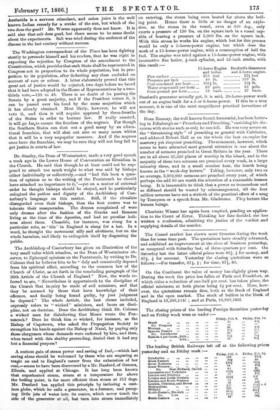A curious gain of steam power and saving of fuel,—which
last saving alone should be welcomed by those who are auguring so tragic an end to England's career from the exhaustion of her coal,—seems to have been discovered by a Mr. Danford, of Geneva, Illinois, and applied at Chicago. It has long been known that superheated steam, steam at a temperature far above the boiling point, is far more efficient than steam at 212 degs. Mr. Danford has applied this principle by inclosing a •cast- iron globe, which he calls a generator, in a furnace, and pump- ing little jets of water into its centre, which never touch the side of the generator at all, but turn into steam immediately on entering, the steam being soon heated far above the boil- ing point. Hence there is little or no danger of an explo- sion, as the steam in the vessel, even at GOO deg., only exerts a pressure of 150 lbs. on the square inch in a vessel cap- able of bearing a pressure of 5,000 lbs. on the square inch.
With this steam he works his engine, which but for this process would be only a 5-horse-power engine, but which does the work of a 15-horse-power engine, with a consumption of half the
fuel. The engine was tried against a 15-horse-power engine, with locomotive flue boiler, 1-inch cylinder, and 15-inch stroke, with this result :—
/5-horse Engine Danford's Generator
and boiler. and 5-horse engine.
Fire saran 310 feet 221 feet Pressure per inch 40 lb. 110 lb. Coal consumed per hour 1011 lb. 531 lb.
Water evaporated per hour... 80 gals. 25 gals. Corn ground per hour 18 bush. 27 bush.
Danford's generator actually got, it is said, 20-horse-power work out of an engine built for a 5 or 6-horse power. If this be a true account, it is one of the most magnificent practical inventions of the day.






























 Previous page
Previous page